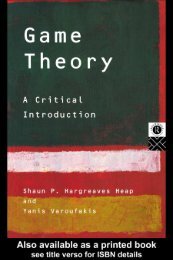handbook-executive-leadership-of-research-development-pdf-v10
handbook-executive-leadership-of-research-development-pdf-v10
handbook-executive-leadership-of-research-development-pdf-v10
Create successful ePaper yourself
Turn your PDF publications into a flip-book with our unique Google optimized e-Paper software.
in relation to the environment conducive to <strong>research</strong> that has been outlined above?What steps will the university use to work strategically towards a <strong>research</strong> plan thatrecognises scholarship, expects <strong>research</strong> activity as a normal part <strong>of</strong> academicworkload, and creates a sense <strong>of</strong> ownership among all staff? What devices willbe in place to deal with staff who may become disaffected as a result <strong>of</strong> a shift inthe importance it attaches to <strong>research</strong> productivity? What support, prestige andrecognition can staff who move in the direction <strong>of</strong> more <strong>research</strong> activity expect?4. Building a <strong>research</strong> culture: issues specific to <strong>research</strong><strong>development</strong> in newer universitiesMany issues connected with the <strong>executive</strong> <strong>leadership</strong> <strong>of</strong> <strong>research</strong> apply equally acrossdifferent types <strong>of</strong> higher education institutions. However, as the work <strong>of</strong> Molfese andcolleagues shows, there are important themes that are specific to the <strong>development</strong> <strong>of</strong><strong>research</strong> activity and capacity in newer universities.Universities that have limited <strong>research</strong> capacity can no longer ignore the forces <strong>of</strong>change that propel them towards enhancing their <strong>research</strong> capability. The generation<strong>of</strong> new knowledge has become a global priority at the highest level <strong>of</strong> politics. Theincreasing importance <strong>of</strong> academic <strong>research</strong> to national governments around theworld, together with greater competition for students, funding and commercialpartnerships, have led to pressures for every university to focus on producing andsharing scholarly outputs. ‘Excellence’ in higher education is progressively more likelyto be defined in terms <strong>of</strong> ‘highly active and productive in <strong>research</strong>’.As we have seen, however, <strong>research</strong> productivity is unevenly distributed betweenindividual academics and between universities. Many newer universities wereestablished as teaching-focused institutions, recruiting academics who were not<strong>research</strong> active; although changes in the UK and Australian higher educationsystems have led to a broader distribution <strong>of</strong> <strong>research</strong> activity, and some staff innewer universities have built active <strong>research</strong> pr<strong>of</strong>iles, there remain large numbers<strong>of</strong> academics at these universities who are neither eager to pursue <strong>research</strong>, norcapable <strong>of</strong> pursuing it effectively.Ellen Hazelkorn has systematically reviewed these issues in a series <strong>of</strong> publicationsthat embrace international perspectives on growing <strong>research</strong> from a ‘fragile base’ 18 .Developing <strong>research</strong> in newer universities (and in older institutions that have anexisting, but relatively poor record <strong>of</strong> <strong>research</strong>) presents redoubtable challenges. ItA background briefing on the evidence19



